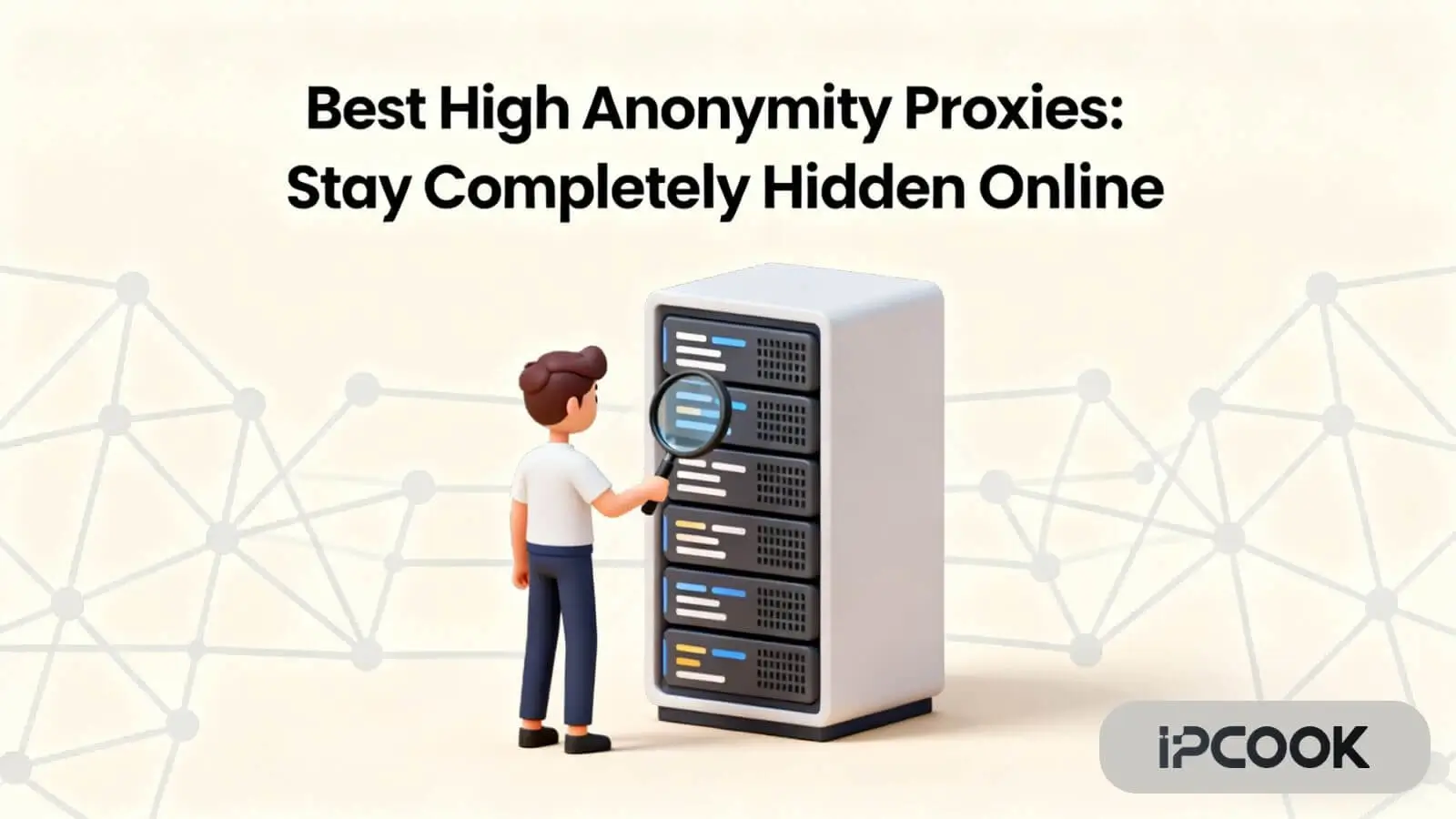


If you've ever searched online for ways to stay private, you've probably heard about proxies. But let me ask you this: have you ever noticed that some sites can still tell you're using one? That's the difference between a basic proxy and a true high-anonymity proxy. A real elite proxy doesn't just hide your IP address; it makes you look like any other regular internet user, which is the ultimate form of online invisibility.
The problem is, so many providers claim to offer this "elite" level service. It can get pretty confusing, right? How do you know which one actually delivers? Don't worry, I've tested them for you. In this article, I'm going to cut through the noise and show you the five best high-anonymity proxy services that truly work, starting with my top pick, IPcook. Let's find the perfect one for your needs.
Now, let's get right into it. After putting dozens of services through their paces, I've narrowed it down to the five best high-anonymity proxy providers out there. These are the ones that truly deliver on their promise of making you invisible online.
If you're looking for the best high-anonymity proxy that truly lives up to the "elite" name, you've got to check out IPcook. It's my top pick because it's been specifically engineered to make you invisible online. We're not just talking about hiding your IP address here; I'm talking about a high-anonymity proxy server that removes all traces of your proxy use, like the X-Forwarded-For and Via headers.
From a performance standpoint, IPcook doesn't disappoint. I was impressed by its blazing speed, with an average global response time under 0.5 seconds. It also gives you incredible control over residential proxies, allowing you to customize how often the IP rotates—with every request or on a timed interval. Combine that with support for high levels of concurrency, and you have a powerful and flexible tool perfect for everything from sensitive data scraping to managing multiple social media accounts without raising any flags.
Here's a quick look at its core strengths:
A massive pool of 55M+ real residential IPs.
Lightning-fast speed with <0.5s average response time.
Flexible IP rotation (per request or by minute) and sticky sessions up to 24 hours.
High concurrency support, handling 100,000 threads at max.
Full protocol support (HTTP, HTTPS, and SOCKS5).
If you're running large-scale operations and need a provider with massive infrastructure, you should definitely know about Oxylabs. In my experience, they position themselves as the enterprise-grade solution in the high-anonymity proxy space. Their biggest strength is undoubtedly the sheer size of their network, which boasts over 177 million residential IPs and covers 195 countries globally. This makes them a reliable high-anonymity proxy server for heavy-duty data scraping tasks that require immense scale and reliability.
However, this power and scale come at a cost. I've found that Oxylabs is generally positioned at a higher price point compared to some other providers. So, while they are a fantastic and robust choice, they might be a bit too much for individual users or small projects with limited budgets. It's a premium service for those who need top-tier resources.
Here's a quick look at its core strengths:
A massive network of over 100 million residential IPs.
Precise targeting capabilities, from country down to city level.
Support for high concurrent connections for seamless scaling.
Around-the-clock live customer support.
Now let's talk about IPBurger. If your main concern is getting a reliable high-anonymity proxy without a complicated setup, this provider is worth your attention. I appreciate them for their straightforward approach to anonymity and user-friendly service. They offer residential, ISP, and mobile proxies, making it a practical choice for various online tasks that require a hidden identity.
While they might not have the colossal network size of some giants, their strength lies in solid performance and ease of use. It's a great option if you want a dependable high-anonymity proxy that just works, without needing to be a technical expert.
Here are its key features:
Provides residential, ISP, and mobile proxy options.
Features a simple, user-friendly dashboard for easy management.
Supports multiple authentication methods, including IP whitelisting.
Offers competitive pricing for personal and small business use.
Another option on my list is 9Proxy, which, in my tests, really stands out if you're working with a tight budget but still need solid performance. It's a high-anonymity proxy service that offers a refreshing pay-per-IP model instead of charging for bandwidth. This means you get unlimited bandwidth, which is a fantastic feature for data-heavy tasks like web scraping, and it helps keep costs predictable.
One slight drawback I noticed is that, as a relatively newer player, its long-term track record isn't as established as some older giants. However, its unique proxy replacement policy for underperforming IPs and extensive geographic coverage still make it a compelling elite proxy choice for cost-conscious users and small to medium projects.
Here's a quick look at its core strengths:
A large pool of over 20 million IPs across 90+ nations.
Unlimited bandwidth with a pay-per-IP model.
Proxy replacement policy for IPs that fail quickly.
Support for HTTP, HTTPS, and SOCKS5 protocols.
The final proxy I'm going to introduce is Evomi, which has carved out a really interesting niche. Where it truly shines is in providing authentic 4G/5G mobile IPs. If your project requires genuine mobile user identities, like mobile app testing or ad verification, this high-anonymity proxy service is a fantastic specialist. The IPs come from real mobile devices, offering you a level of authenticity that's hard to beat for specific tasks.
One area where I felt it could be more flexible is session control. Unlike some competitors that let you fine-tune sticky sessions to the minute, Evomi's options for session duration are a bit more limited. This might not be a deal-breaker, but it's something to note if you need very precise control over how long an IP stays connected.
Here are its key features:
Specializes in authentic 4G/5G mobile IPs.
Provides both static and rotating IP options.
Features a simple, intuitive user dashboard.
Supports flexible pay-as-you-go billing.
All the proxy services above offer high-anonymity proxies. But did you know that not all proxies hide your identity the same way? It's true. Generally, there are three main levels of anonymity you'll encounter, and understanding them is key to staying truly hidden online. Let me break them down for you.
Let's start with the most basic type: transparent proxies. Honestly, calling them "proxies" is a bit generous when it comes to privacy. The truth is, they don't hide your information at all. A transparent proxy will forward your real IP address to the website you're visiting in the X-Forwarded-For header. It's basically an open book—the website knows both that you're using a proxy and exactly who you are. So, why would anyone use this? These aren't for hiding; they're primarily for control and efficiency.
Common use cases for transparent proxies:
Enforcing content filtering policies in a school or office network.
Caching frequently accessed websites to speed up load times for users.
Basic network monitoring and traffic management by IT administrators.
Allowing guest Wi-Fi users to bypass compulsory portal pages.
Let's move up a level to anonymous proxies. I like to think of these as a middle ground. They do a decent job of hiding your real IP address from the website you visit, which is a big step up. However, here's the catch: they usually let the site know that you're connecting through a proxy server. So while you're hidden, your method isn't entirely a secret. It's like wearing a disguise, but everyone can see you bought it from a costume shop. This level of anonymity suffices when you need some privacy but don't require total invisibility.
Common use cases for anonymous proxies:
Bypassing simple geographic blocks to access streaming content.
General web browsing with a basic layer of identity protection.
Conducting light market research without your direct IP being logged.
Posting on forums or social media without revealing your location.
Now we get to the gold standard: high-anonymity proxies, also known as elite proxies. These proxies don't just hide your real IP address; they also conceal the fact that you're using a proxy at all. They achieve this by not sending any proxy-identifying headers like Via or X-Forwarded-For to the destination website. To any site you visit, you look exactly like a regular user connecting directly from a residential IP. You need this elite level of protection for sensitive tasks where being detected could get you blocked or cause issues.
Common use cases for high-anonymity proxies:
Web scraping and data collection from well-protected websites.
Competitive intelligence and market research on rival platforms.
Managing multiple social media or e-commerce accounts securely.
Any sensitive online activity where your identity and method must be 100% undetectable.
Now that you know the options, how do you actually choose the right one for you? It can feel overwhelming, but from my experience, focusing on a few key areas makes the decision much easier. Here are the main factors I always consider when testing a high anonymity proxy service. Think of it as a personal checklist.
Verify True Anonymity: Don't just take their word for it. Use a tool like whoer.net to check if the proxy leaks your real IP or sends any tell-tale proxy headers.
Assess IP Pool Quality: Look for a large, diverse pool of real residential IPs, not just datacenter IPs, to better blend in with normal traffic.
Test Speed and Reliability: A slow proxy can be useless. Check for performance metrics like response time and uptime guarantees.
Check for Essential Features: Ensure it supports the protocols you need (like SOCKS5) and offers useful controls like flexible rotation and sticky sessions.
Evaluate Concurrency and Support: If you run multiple tasks, check the concurrent thread limits. Good customer support is also a lifesaver.
In most cases, using a high-anonymity proxy is perfectly legal. It's a common tool for privacy protection or for accessing geo-blocked content, like watching a show that's not available in your country. The key thing to remember is that the tool itself isn't the problem; it's what you do with it. Just like any technology, it becomes illegal if you use it for malicious attacks, fraud, or other criminal activities. Therefore, always use it responsibly.
No, you can't be 100% anonymous. The best elite proxy is fantastic at hiding your IP address and the fact that you're using a proxy. But your online identity is more than just an IP. Websites can still gather other digital fingerprints from you, like your device model, browser type, screen resolution, and even your timezone. For true privacy, I often recommend combining a proxy with tools that help mask these other fingerprints. It's about layers of protection.
I hope this guide has been a helpful starting point in your search for the right high-anonymity proxy. We've walked through the different anonymity levels and compared some of the top providers in the field. From my own testing, I find that IPcook consistently offers a strong blend of true elite anonymity, a massive pool of residential IPs, and reliable performance, making it an excellent all-arounder to consider for most serious projects.
But remember, the best choice always depends on your specific needs, whether that's raw power, mobile IPs, or budget-friendly options. Ultimately, taking the time to match a provider's strengths to your task is the real key to staying secure and efficient online.